Ibogaine and Serotonin: An Essay on the Intersection of a Psychedelic Alkaloid and Neurochemistry
In the complex tapestry of human neurochemistry, serotonin stands out as one of the most influential neurotransmitters, steering our moods, emotions, and overall mental well-being. At the intersection of traditional healing practices and modern neuroscience lies ibogaine—a naturally occurring psychoactive substance derived from the root bark of the African shrub Tabernanthe iboga. This essay explores the intriguing relationship between ibogaine and serotonin, delving into how this plant alkaloid interacts with our brain's serotonergic system to produce profound psychological effects.
Serotonin is colloquially known as the "happiness chemical" due to its association with feelings of well-being and happiness. It plays a critical role in regulating mood, anxiety, appetite, sleep, memory, and other aspects of behavior. A deficiency in serotonin levels or disruptions in its signaling pathways can lead to various psychiatric disorders such as depression, anxiety disorders, and obsessive-compulsive disorder.
Enter ibogaine—an indole alkaloid that has been used for centuries by indigenous peoples in Western Central Africa for ritualistic purposes and as a rite of passage into adulthood. In recent decades, however, it has gained attention for its potential therapeutic properties in treating addiction to opioids and other substances.
What makes ibogaine particularly fascinating is its multifaceted mechanism of action within the brain. Unlike traditional selective serotonin reuptake inhibitors (SSRIs) that are commonly prescribed for depression—which work by increasing serotonin availability at synapses—ibogaine's interaction with serotonin receptors is more complex.
Research suggests that ibogane acts on several neurotransmitter systems simultaneously; among these actions is its ability to modulate serotonergic pathways. Ibogaine binds to serotonin transporter proteins (SERT), which are responsible for reclaiming serotonin from synaptic spaces back into neurons after it has fulfilled its signaling function. By doing so, it alters serotonergic transmission in ways that may contribute to mood elevation and a decrease in craving behaviors typically associated with substance dependence.
Furthermore, ibogaine also possesses affinity for sigma-2 receptors which have indirect interactions with serotonergic signaling pathways. The engagement with these receptors further emphasizes the compound's unique psychotherapeutic effects which could potentially extend beyond addiction treatment to include mood disorders where dysregulated serotonin levels play a part.
The psychedelic experience elicited by ibogaine is another avenue through which changes in consciousness might intersect with alterations in serotoneric activity. Users often report experiences characterized by vivid visualizations, introspection, and emotional catharsis—effects that some suggest could be partially mediated through indirect modulation of serotonergic circuits combined with activity at other receptor sites including those responsive to glutamate—the primary excitatory neurotransmitter—and acetylcholine involved in cognition.
It's important to note that while anecdotal evidence points towards positive outcomes following ibogaine administration for substance use disorders among others; rigorous clinical trials remain sparse due largely to regulatory hurdles surrounding psychedelics research and safety concerns related specifically toward this compound’s cardiotoxic potential.
Despite these challenges facing scientific investigation into ibogaines therapeutic utility; ongoing interest persists driven partly because existing therapies for certain neuropsychiatric conditions leave many patients underserved thereby warranting exploration into novel agents like this enigmatic alkaloid whose interplay with our brains own chemistry hints at untapped possibilities yet fully understood or realized within psychiatry’s current pharmacopeia.
In conclusion; understanding how exactly an exotic molecule like iboga-derived ibogain influences something as pivotal as our body’s own intricate web woven around 'serotonin' will require not only open-minded scientific inquiry but also careful consideration toward ethical implications surrounding use traditional medicines outside their original cultural contexts—a conversation continuing evolve alongside exciting advancements within psychopharmacology field today.
